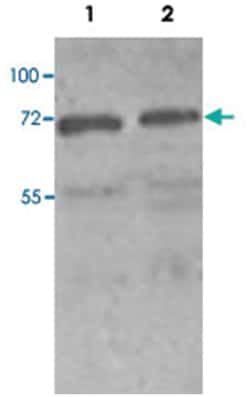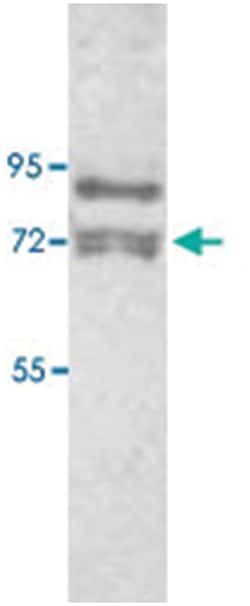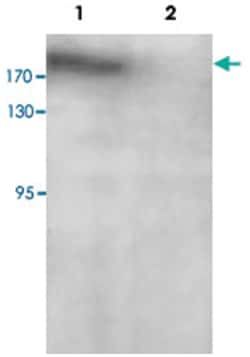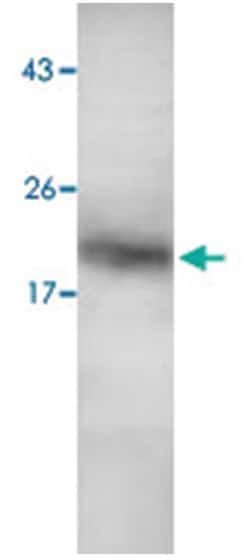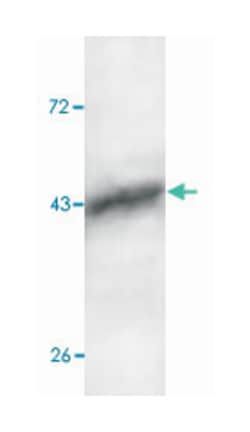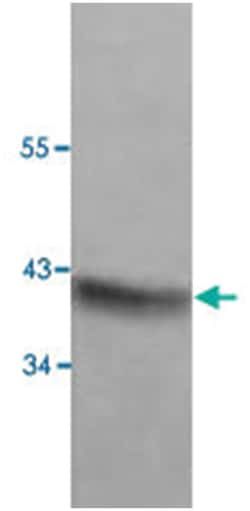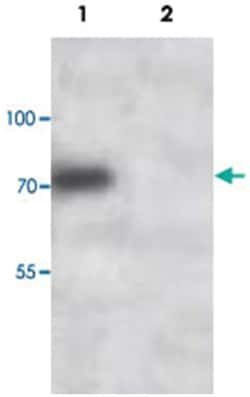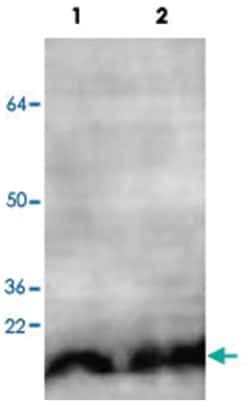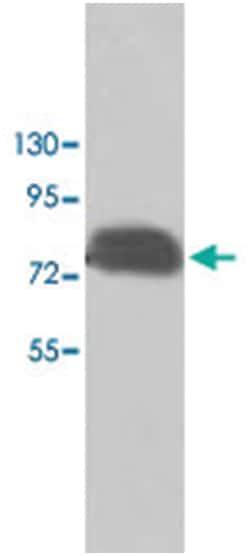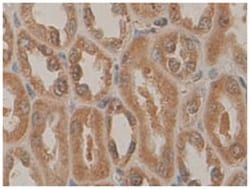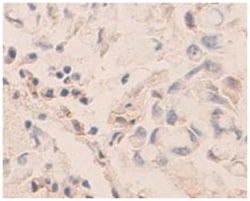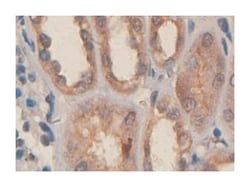89-120-442
PAK6 Rabbit anti-Human, Polyclonal Antibody, Abnova™
Manufacturer: Abnova Corporation
Select a Size
| Pack Size | SKU | Availability | Price |
|---|---|---|---|
| Each of 1 | 89-120-442-Each-of-1 | In Stock | ₹ 55,803.00 |
89-120-442 - Each of 1
In Stock
Quantity
1
Base Price: ₹ 55,803.00
GST (18%): ₹ 10,044.54
Total Price: ₹ 65,847.54
Antigen
PAK6
Classification
Polyclonal
Description
Rabbit polyclonal antibody raised against synthetic peptide of PAK6.
Formulation
In buffer containing 0.02% sodium azide
Gene Alias
PAK5
Host Species
Rabbit
Quantity
100 μg
Primary or Secondary
Primary
Target Species
Human
Form
Liquid
Applications
ELISA, Western Blot
Conjugate
Unconjugated
Dilution
ELISA (1:20000) Western Blot (1:100-1:500) The optimal working dilution should be determined by the end user.
Gene
PAK6
Gene Symbols
PAK6
Immunogen
A synthetic peptide corresponding to 15 amino acids at N-terminus of human PAK6.
Regulatory Status
RUO
Gene ID (Entrez)
56924
Content And Storage
Store at 4°C for three months. For long term storage store at -20°C.Aliquot to avoid repeated freezing and thawing.
Description
- This gene encodes a member of the p21-activated kinase (PAK) family
- The proteins of this family are Rac/Cdc42-associated Ste20-like Ser/Thr protein kinases, characterized by a highly conserved amino-terminal Cdc42/Rac interactive binding (CRIB) domain and a carboxyl-terminal kinase domain
- PAK kinases are implicated in the regulation of a number of cellular processes, including cytoskeleton rearrangement, apoptosis and the MAP kinase signaling pathway
- The protein encoded by this gene was found to interact with androgen receptor (AR), which is a steroid hormone-dependent transcription factor that is important for male sexual differentiation and development
- This gene was found to be highly expressed in testis and prostate tissues and the encoded protein was shown to cotranslocate into the nucleus with AR in response to androgen
- Alternatively spliced transcript variants encoding the same protein have been found for this gene
- [provided by RefSeq
Compare Similar Items
Show Difference
Antigen: PAK6
Classification: Polyclonal
Description: Rabbit polyclonal antibody raised against synthetic peptide of PAK6.
Formulation: In buffer containing 0.02% sodium azide
Gene Alias: PAK5
Host Species: Rabbit
Quantity: 100 μg
Primary or Secondary: Primary
Target Species: Human
Form: Liquid
Applications: ELISA, Western Blot
Conjugate: Unconjugated
Dilution: ELISA (1:20000) Western Blot (1:100-1:500) The optimal working dilution should be determined by the end user.
Gene: PAK6
Gene Symbols: PAK6
Immunogen: A synthetic peptide corresponding to 15 amino acids at N-terminus of human PAK6.
Regulatory Status: RUO
Gene ID (Entrez): 56924
Content And Storage: Store at 4°C for three months. For long term storage store at -20°C.Aliquot to avoid repeated freezing and thawing.
Antigen:
PAK6
Classification:
Polyclonal
Description:
Rabbit polyclonal antibody raised against synthetic peptide of PAK6.
Formulation:
In buffer containing 0.02% sodium azide
Gene Alias:
PAK5
Host Species:
Rabbit
Quantity:
100 μg
Primary or Secondary:
Primary
Target Species:
Human
Form:
Liquid
Applications:
ELISA, Western Blot
Conjugate:
Unconjugated
Dilution:
ELISA (1:20000) Western Blot (1:100-1:500) The optimal working dilution should be determined by the end user.
Gene:
PAK6
Gene Symbols:
PAK6
Immunogen:
A synthetic peptide corresponding to 15 amino acids at N-terminus of human PAK6.
Regulatory Status:
RUO
Gene ID (Entrez):
56924
Content And Storage:
Store at 4°C for three months. For long term storage store at -20°C.Aliquot to avoid repeated freezing and thawing.
Antigen: PDCD5
Classification: Polyclonal
Description: Rabbit polyclonal antibody raised against synthetic peptide of PDCD5.
Formulation: In buffer containing 0.02% sodium azide, 2% BSA
Gene Alias: MGC9294/TFAR19
Host Species: Rabbit
Quantity: 100 μg
Primary or Secondary: Primary
Target Species: Human, Mouse, Rat
Form: Liquid
Applications: ELISA, Immunohistochemistry (PFA fixed)
Conjugate: Unconjugated
Dilution: ELISA (1:1000-1:10000) Immunohistochemistry (1:50-1:200) The optimal working dilution should be determined by the end user.
Gene: PDCD5
Gene Symbols: PDCD5
Immunogen: A synthetic peptide corresponding to amino acids of N-terminus of human PDCD5.
Regulatory Status: RUO
Gene ID (Entrez): 9141
Content And Storage: Store at 4°C for three months. For long term storage store at -20°C.Aliquot to avoid repeated freezing and thawing.
Antigen:
PDCD5
Classification:
Polyclonal
Description:
Rabbit polyclonal antibody raised against synthetic peptide of PDCD5.
Formulation:
In buffer containing 0.02% sodium azide, 2% BSA
Gene Alias:
MGC9294/TFAR19
Host Species:
Rabbit
Quantity:
100 μg
Primary or Secondary:
Primary
Target Species:
Human, Mouse, Rat
Form:
Liquid
Applications:
ELISA, Immunohistochemistry (PFA fixed)
Conjugate:
Unconjugated
Dilution:
ELISA (1:1000-1:10000) Immunohistochemistry (1:50-1:200) The optimal working dilution should be determined by the end user.
Gene:
PDCD5
Gene Symbols:
PDCD5
Immunogen:
A synthetic peptide corresponding to amino acids of N-terminus of human PDCD5.
Regulatory Status:
RUO
Gene ID (Entrez):
9141
Content And Storage:
Store at 4°C for three months. For long term storage store at -20°C.Aliquot to avoid repeated freezing and thawing.
Antigen: PDCD6
Classification: Polyclonal
Description: Rabbit polyclonal antibody raised against synthetic peptide of PDCD6.
Formulation: In buffer containing 0.02% sodium azide, 2% BSA
Gene Alias: ALG-2/FLJ46208/MGC111017/MGC119050/MGC9123/PEF1B
Host Species: Rabbit
Quantity: 100 μg
Primary or Secondary: Primary
Target Species: Human, Mouse
Form: Liquid
Applications: ELISA, Immunofluorescence, Immunohistochemistry (PFA fixed)
Conjugate: Unconjugated
Dilution: ELISA (1:1000-1:10000) Immunohistochemistry (1:50-1:200) Immunofluorescence (1:50-1:100) The optimal working dilution should be determined by the end user.
Gene: PDCD6
Gene Symbols: PDCD6
Immunogen: A synthetic peptide corresponding to 15 amino acids of human PDCD6.
Regulatory Status: RUO
Gene ID (Entrez): 10016
Content And Storage: Store at 4°C for three months. For long term storage store at -20°C.Aliquot to avoid repeated freezing and thawing.
Antigen:
PDCD6
Classification:
Polyclonal
Description:
Rabbit polyclonal antibody raised against synthetic peptide of PDCD6.
Formulation:
In buffer containing 0.02% sodium azide, 2% BSA
Gene Alias:
ALG-2/FLJ46208/MGC111017/MGC119050/MGC9123/PEF1B
Host Species:
Rabbit
Quantity:
100 μg
Primary or Secondary:
Primary
Target Species:
Human, Mouse
Form:
Liquid
Applications:
ELISA, Immunofluorescence, Immunohistochemistry (PFA fixed)
Conjugate:
Unconjugated
Dilution:
ELISA (1:1000-1:10000) Immunohistochemistry (1:50-1:200) Immunofluorescence (1:50-1:100) The optimal working dilution should be determined by the end user.
Gene:
PDCD6
Gene Symbols:
PDCD6
Immunogen:
A synthetic peptide corresponding to 15 amino acids of human PDCD6.
Regulatory Status:
RUO
Gene ID (Entrez):
10016
Content And Storage:
Store at 4°C for three months. For long term storage store at -20°C.Aliquot to avoid repeated freezing and thawing.
Antigen: PDGFC
Classification: Polyclonal
Description: Rabbit polyclonal antibody raised against partial recombinant PDGFC.
Formulation: In buffer containing 0.02% sodium azide, 2% BSA
Gene Alias: FALLOTEIN/SCDGF
Host Species: Rabbit
Quantity: 200 μL
Primary or Secondary: Primary
Target Species: Human, Mouse, Rat
Form: Liquid
Applications: ELISA, Immunohistochemistry (PFA fixed), Western Blot
Conjugate: Unconjugated
Dilution: ELISA (1:80000) Western Blot (1:200-1:1000) Immunohistochemistry (1:50-1:200) The optimal working dilution should be determined by the end user.
Gene: PDGFC
Gene Symbols: PDGFC
Immunogen: Recombinant protein corresponding to 158 amino acids at C-terminus of human PDGFC.
Regulatory Status: RUO
Gene ID (Entrez): 56034
Content And Storage: Store at 4°C for three months. For long term storage store at -20°C.Aliquot to avoid repeated freezing and thawing.
Antigen:
PDGFC
Classification:
Polyclonal
Description:
Rabbit polyclonal antibody raised against partial recombinant PDGFC.
Formulation:
In buffer containing 0.02% sodium azide, 2% BSA
Gene Alias:
FALLOTEIN/SCDGF
Host Species:
Rabbit
Quantity:
200 μL
Primary or Secondary:
Primary
Target Species:
Human, Mouse, Rat
Form:
Liquid
Applications:
ELISA, Immunohistochemistry (PFA fixed), Western Blot
Conjugate:
Unconjugated
Dilution:
ELISA (1:80000) Western Blot (1:200-1:1000) Immunohistochemistry (1:50-1:200) The optimal working dilution should be determined by the end user.
Gene:
PDGFC
Gene Symbols:
PDGFC
Immunogen:
Recombinant protein corresponding to 158 amino acids at C-terminus of human PDGFC.
Regulatory Status:
RUO
Gene ID (Entrez):
56034
Content And Storage:
Store at 4°C for three months. For long term storage store at -20°C.Aliquot to avoid repeated freezing and thawing.
